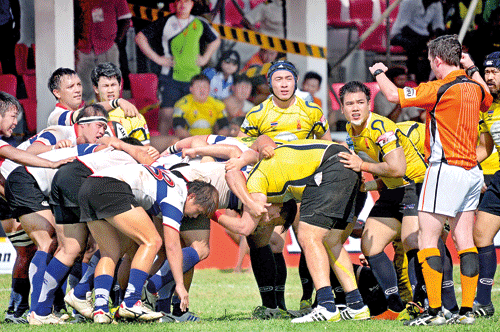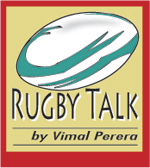Consistency in enforcing on-field decisions sans fear or favour
View(s):
Unlike foreign teams, referees' calls are often igonred by most local players - File pic
Fox Sports reports, “A Newcastle player banned for 10 years for his brutal hit on the referee who had just sent him off.” The player has also been charged with common assault and will face the local court on October 4. This was in an Under-19 match, where a junior referee was trying to ‘red card’ a player for a lifting tackle. This happened during the weekend and the ban was effected by September 7, while the player read a 3-page letter of apology. He told the adjudicating officers he was sorry for his action, but it was not enough to save him. This fits very much with the oft quoted “Hot-Stove Rule” of Douglas McGregor, on imposing disciplinary action without generating resentment.
This rule draws an analogy between touching a hot stove, and undergoing discipline. When you touch the hot stove, you burn your hand. The burn was immediate. Will you blame the hot stove for burning your hand? Immediately, you understand the cause and effect of the offense. You had a warning, as you knew the stove was red hot, and you knew what would happen to you if you touched it. You knew the rules and regulations previously issued to you prescribing the penalty for violation of any particular rule, so you cannot claim you were not given a previous warning. The discipline was consistent. Every time you touch the hot stove you get burned. Consistency in the administration of disciplinary action is essential. Excessive leniency, as well as too much harshness, creates not only dissatisfaction, but also resentment. The discipline was impersonal. Whoever touches the hot stove gets burned, no matter who.
Recently, a match official was assaulted after the final of the Mercantile Rugby Sevens played on July 23. It took a couple of weeks for a disciplinary decision to be taken and a 2-year ban imposed against participating in Mercantile 7s, and any other action is up to the governing body, that I am told are looking into it. What is most important is to stick to the McGregor thinking of the burning stove. Asked about this, I was told the Referees’ Society is in contact, but cannot push the governing body. What a loutish reply, I thought for myself. This is in the world of Sri Lanka Ministers having had to bid adieu and top government administrators being sentenced. This will lead to a situation for a door to be opened in the future, where precedence will demand acting more responsibly.
This selective treatment will not work in Rugby, as the World Rugby Laws on concussion are implemented. World Rugby has approved an amendment to the law, making it mandatory for players who undertake an off-field screening under the Head Injury Assessment (HIA) protocol, not to return before 10 minutes (actual time) have elapsed. The amendment comes into effect globally, from August 26, and applies to all participating elite adult Rugby competitions. It amends the previous time stipulation, which included no minimum requirement.
 I have often seen, when a player is sent off for HIA, there is pressure from coaches and other administrators to send the victim back, even when the doctor says “No”. I have seen boorish officials and administrators trying to pressurize a 4th and 5th official to send an ‘injured’ player back. One such incidence was the replacement of a player whose pedigree was more important to the ape, who wanted the match official to do as he says. Can this selective administration happen on the field, within the recent directive of World Rugby? This will put pressure on match officials which include medical staff and referees. The question, however, remains whether HIA should be allowed in all forms of matches. The HIA is allowed only for elite adult Rugby competitions. In Sri Lanka, we use it at all matches, despite whether the medical staff in attendance are aware of World Rugby concussion guidelines. Remember, you can go back if the doctor clears you, and there can be no arguments about it. Where there is no doctor appointed by the match organisers, the responsibility is with the referee. Which means that, if a referee indicates a head injury, the player cannot go back.
I have often seen, when a player is sent off for HIA, there is pressure from coaches and other administrators to send the victim back, even when the doctor says “No”. I have seen boorish officials and administrators trying to pressurize a 4th and 5th official to send an ‘injured’ player back. One such incidence was the replacement of a player whose pedigree was more important to the ape, who wanted the match official to do as he says. Can this selective administration happen on the field, within the recent directive of World Rugby? This will put pressure on match officials which include medical staff and referees. The question, however, remains whether HIA should be allowed in all forms of matches. The HIA is allowed only for elite adult Rugby competitions. In Sri Lanka, we use it at all matches, despite whether the medical staff in attendance are aware of World Rugby concussion guidelines. Remember, you can go back if the doctor clears you, and there can be no arguments about it. Where there is no doctor appointed by the match organisers, the responsibility is with the referee. Which means that, if a referee indicates a head injury, the player cannot go back.
There will be other issues for arguments and conflicts, even when a doctor is in attendance, and the referee acts as advised. The majority want a match won and, if they feel the player is important, the issue will rise to conflict, leading to assault. It is like what happened in the Mercantile 7s, when the bench disagreed with the substitution official’s directive not to enter the field till there is a break. The list of on-field match officials include the official medical staff, and the referee has to go by them. Not a Medical Person who is part of the team. Which means, there needs to be strict policing and implementation of discipline to all, and not to selective some.
Vimal Perera is a former Rugby
Referee, coach and Accredited
Referees Evaluator IRB


